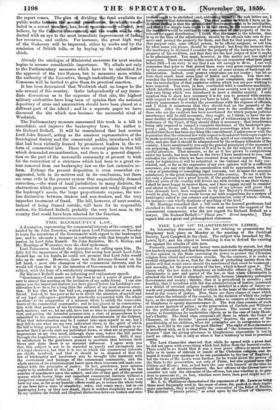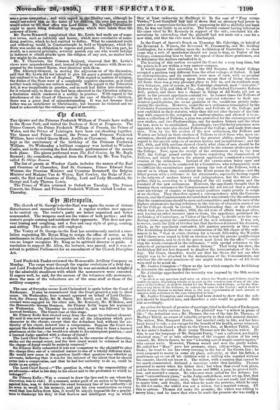THE LAW OF BLASPHEMOUS LIBEL.
An interesting discussion on the law relating to prosecutions for blasphemy took place on Monday at the meeting of the Juridical Society, Lord Campbell in the chair. The subject was broached by Mr Lewis, Q.C., and his object in broaching it was to defend the existing law against the attacks of able men. Formerly, nonconformity and heresy were indictable by statute, but that law has been repealed, and that being the case there is not anything prejudicial to free opinion in the State exercising its power to protect the Christian religion from ribald and scurrilous attacks. On the contrary, it is under a twofold obligation to d& so, first for- the sake of protecting society from the public evil that would ensue should the sanctions of that creed be weakened ; and secondly, for the preservation of the law, which iabased upon it. The reason why the law makes blasphemy an indictable offence is,—first, that Christianity is part and parcel of the law, so that when Christianity is attacked the law itself is attacked; secondly, because blasphemy endangers Government and society ; thirdly, that it is prejudicial to morality ; and fourthly, that it interferes with the due administration of justice, inasmuch' as a denial of revealed religion implies a disbelief in a state of future re- wards and punishments, the belief in which is the basis of the oath adminis- tered in the courts of justice. Now, there are three classes of cases which come before the tribunals of the country, in the decision of which the judges
re
have, as the representatives of the State, either to connive at the existence of blasphemy or openly discountenance it. The first class consists of such cases as are matters of police ; as the prosecution of Carlisle and Williams for the publication of Paine's Age of Reason. The second set or class relates to foundations for unchristian objects, as in the case of Lady Head ley's Charity. The third class comprises all those in which the Court of Chancery, on the doctrine " parens patrire," deprives the parent of the guardianship of his children, when his principles are in antagonism to re- ligion, as it did in the case of the poet Shelley. The right of free disoussion is interfered with, as it is clear from the case of "the Attorney-Generale. Pearson" that the giving utterance to blasphemous expressions is not in itself an offence, but is only so when it has a tendency to lead to practical results.
The Lord Chancellor observed that while he agreed with a great deal he did not agree with everything which had fallen from the learned reader. There could be no doubt that it was a very grave offence-to speak scorn- fully or in terms of ridicule or insult of the Christian religion, and he hoped it would ever continue to be one punishable by the law of England but the views of Mr. Lewis went further, for he would direct the powers of the State to the prosecution, not only of Paine, but also against men like Gibbon and Hume; but, as had been the case with himself at the time he held the office of Attorney-General, the law officers Of the Crowsi, have to consider not only the character of the offence, but also whether it ts-pro.- dent to prosecute it ; in fact, whether more harm than good might not re- sult from the proceedings.
Mr. L. G. Phillimore characterized the arguments of Mr. Lewis as being those most frequently used in the cause of error, for, pushed to their legiti- mate conclusion, they would justify the revocation of the Edict of Nantes. The doctrine " parens patrire," as acted upon by the Court of Chancery, wasa gross usurpation ; and with regard MetheBhelley case, although he wsuld-notselect him as the tutor of his children, the very fast persen he 'would select to 'fill that office was Lord Elden. He thought Christianity ought to spurn being defended by weapons which were taken from the armoury of error. Mr. Baron Bramwell complained that Mr. Lewis bad made use of negas Live terms, such as infidelity and heresy, which were correlative of some- thing positive, which he had omitted to define.. What he considered truth and orthodoxy would.. in Constantinople be held as blasphemy, whioh the State was under an obligation to repress and punish. For his own part, he would, as a general principle; severely punish any one who would Indulge in indecent or ribald attacks upon the religion of any sect, no matter how few might beits members. Mr. T. Chambers, the COmmon Serjeant, observed that Mr. Lewis's views were misunderstood, and, instead of being at variance with those ex- pressed by the learned-Baron, were identical with them.
The Attorney-General, in moving the adjournmant of the discussion, said that Mr; Lewis did not intend to give his paper a general application, but confined it to the law of England. With regard to matters of religion, the duties of the State were of a completely negative character, as it could neither teach religion nor enforce morality. With regent to the Toleration Act, it was inapplicable in practice, and-as such had fallen into desuetude, for it related only to those who had been educated in the Christian religion, a limitation which rendered it a nullity in practice. With regard to the interference of the Court of Chancery in- the case of Shelley's children, there was a great deal of misunderstanding. It was not because their father was an unbeliever- in- Christianity, but because he violated and re- fused to acknowledge the ordinary usages of Morality.



























 Previous page
Previous page